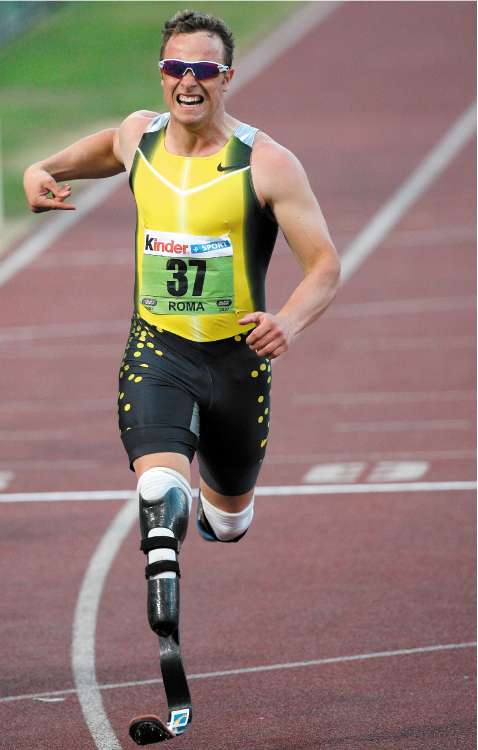Double amputee wins right to race in the Olympics – but is he fast enough?

Your support helps us to tell the story
From reproductive rights to climate change to Big Tech, The Independent is on the ground when the story is developing. Whether it's investigating the financials of Elon Musk's pro-Trump PAC or producing our latest documentary, 'The A Word', which shines a light on the American women fighting for reproductive rights, we know how important it is to parse out the facts from the messaging.
At such a critical moment in US history, we need reporters on the ground. Your donation allows us to keep sending journalists to speak to both sides of the story.
The Independent is trusted by Americans across the entire political spectrum. And unlike many other quality news outlets, we choose not to lock Americans out of our reporting and analysis with paywalls. We believe quality journalism should be available to everyone, paid for by those who can afford it.
Your support makes all the difference.A double amputee is preparing to make Olympic history after he was given the green light to compete for a place in races against able-bodied athletes at this summer's Beijing games.
Oscar Pistorius, a 21-year-old business student from Pretoria, South Africa, yesterday heard the judgment he has been fighting for for two years when the Court of Arbitration for Sport ruled that the man nicknamed "The Bladerunner" could seek to contest an Olympic place. It dismissed the argument that his hi-tech, carbon fibre prosthetic legs – known as Cheetahs – offered him an unfair advantage over other runners.
Pistorius has long striven to become the first disabled athlete to bridge the gap between the Paralympics – where he won 200 metres gold in 2004 – and the Olympics. Having raced against, and defeated, able-bodied opponents, he has never given up hope that the sport would allow him to run at the Games.
He has said: "There's nothing anyone else can do that I can't do." But in January the International Association of Athletics Federations ruled he could not compete in open competition after commissioning scientific studies of his prosthetics.
But that judgment has now been overturned by CAS, which concluded: "On the basis of the evidence brought by the experts called by both parties, the panel was not persuaded that there was sufficient evidence of any metabolic advantage in favour of the double amputee using the Cheetah Flex-Foot."
Pistorius, who was born without bones in his lower legs and had both amputated when he was one year old, reacted with joy after the hearing in Milan."I don't think 'really happy' describes it," he said. "I'm ecstatic. The battle has been going on for far too long. It is a victory for sports in general. I think this day will go down in history.
"Now I can definitely say the truth has come out. I have the opportunity once again to chase my dream of the Olympics, if not in 2008, then in 2012."
Pistorius accepts it will be difficult to earn a run in Beijing given that he only has until 23 July to clock a qualifying time. He could run without a qualifying time in the relay – but the South African team is currently struggling to qualify.
There will now be a huge groundswell of support in South Africa for the brash blond who has always insisted that he could compete. He already has widespread commercial backing, and a sponsored sports car bearing his name in six-inch white letters which, he has been happy to assert, has proved a reliable "babe magnet".
The athlete, though, has faced criticism in the past from his fellow Paralympians. Marlon Shirley, an American single amputee whom he beat to the 200m title in Athens, complained afterwards that his opponent had an unfair "locomotive advantage" in the form of his Cheetah prosthetic legs, which he has had fashioned by an expert team of Icelandic engineers.
But the multiple Paralympic champion Tanni Grey-Thompson said last year that Pistorius's case had "provoked a debate about what it is to be disabled, and what it is to be able bodied. The spina bifida sufferer, who has won 16 Paralympic medals, said: "People will say he can pick the length and style of his prosthetics, so maybe that gives him an unfair advantage, I think it's probably more of a disadvantage to be running with two lower limbs missing."
Richard Callicott, a director of the British Paralympic Association, accepted that some able-bodied athletes might fear that Pistorius could have an unfair advantage over them. "One argument is, let him get on with it... but others think his prosthetics give him an advantage. Once he gets up to speed his strides are immense, and he gets faster as the race gets longer."
Mr Callicott also warned: "If he is allowed to compete in able-bodied competition, there are people out there who would do unbelievable things to get their moment of glory."
Pistorius was emphatic that he would still compete in this year's Paralympics in September, whether he qualified for the able-bodied Olympics or not. "Sport is supposed to bring people together, not judge and separate," he said.
In a statement, the IAAF, said: "The IAAF accepts the decision of CAS, and Oscar will be welcomed wherever he competes this summer. He is an inspirational man and we look forward to admiring his achievements in the future."
Join our commenting forum
Join thought-provoking conversations, follow other Independent readers and see their replies
Comments